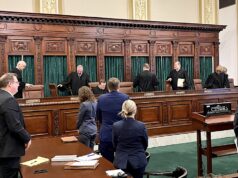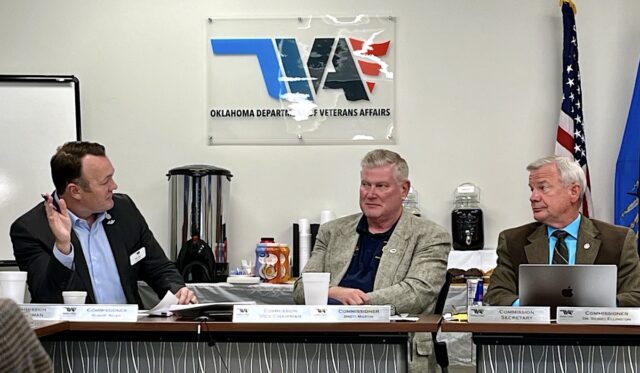

Between the drama in the U.S. House of Representatives and the tragic news coming out of Israel and Gaza, you may have been distracted Oklahoma headlines lately.
To stay apprised of a variety of state issues, review these Oklahoma updates about public bodies, judicial positions, education issues and more.
Veterans Commission approves rule, talks nomination process
At a meeting Friday, the Oklahoma Veterans Commission unanimously approved a policy requiring the Department of Veterans Affairs to charge significant fees for processing any request for documents or information made under the Oklahoma Open Records Act.
Commissioners approved a policy that says “fees shall be charged for providing any records or documents requested of the OVC, any ODVA facility or the ODVA central office.”
Beyond fees for photocopies — 10 cents per page and $1 per page for certified copies — the policy requires members of the public and media requesting public records to pay ODVA $25 for any copy of audio or video from a Veterans Commission meeting, as well as a series of hourly fees related to “staff research time,” including:
- $25 per hour for administrative staff;
- $75 per hour for direct care nursing staff;
- $100 per hour for legal review time.
The policy also requires requesters of records to pay the “actual cost” per disk or jump drive used to provide records, “plus any research time required to complete the search.”
After the meeting, Chairman Rob Allen told NonDoc that he had spoken with ODVA director Greg Slavonic and general counsel John Settle to confirm that, despite the word “shall” in the new rule, they have “no intention to charge members of the media for the things that you’re used to obtaining through Open Records Act requests.”
“The intent was, you’ve got some for-profit corporations that make these public record requests trying to get at certain data for research purposes or for whatever that require substantial work from people in the facilities and in the homes, and sometimes they are privileged requests so it requires an attorney to redact things,” Allen said. “So that’s where the policy is coming from.”
The policy approved Friday by the Veterans Commission states that it is pursuant to Title 51, Section 24A.5 of state statute, which includes a specification:
In no case shall a search fee be charged when the release of records is in the public interest, including, but not limited to, release to the news media, scholars, authors and taxpayers seeking to determine whether those entrusted with the affairs of the government are honestly, faithfully, and competently performing their duties as public servants.
While “legal review” and costs related to flash drives or photocopies could be considered outside of “a search fee,” Allen said he has already discussed the difference between “shall” and “may” in the new policy’s language with ODVA staff and other commissioners.
“It’s certainly not without some ambiguity there, so we may choose to revisit it. But if you run into any issue, call me or email me,” Allen said. “I want to be as transparent as absolutely possible.”
During Friday’s meeting, commissioners heard updates about the Talihina Veterans Home, which is slated to close Oct. 31. Although more than 30 residents were living there when the Veterans Commission began its closure process this summer, only two remain. Both are set to move by Oct. 26, commissioners learned Friday.
Sen. Brenda Stanley (R-Midwest City) and Secretary of Military and Veterans Affairs John Nash also spoke to the Veterans Commission about conversations they’ve had recently with three of the four veteran services organizations that have statutory authority to send the governor nominees for appointment to the commission. Gov. Kevin Stitt’s office has argued that those organizations have not met statutory reporting requirements, however, and a dispute has included litigation over the nomination and appointment process.
Stanley and Nash said their outreach to Oklahoma chapters of the Disabled American Veterans, the Paralyzed Veterans of America and the Veterans of Foreign Wars was intended to create a pathway for the organizations to demonstrate “compliance” with the statutory reporting requirement for the resumption of nominee submission.
Nash said the VFW “responded, regrettably, that they’re going to forgo meetings or further action at this point.” He said no meeting was held with the Purple Heart Association “because of the litigation that is still pending in the courts.”
Nash said the meeting with the Disabled American Veterans chapter went well and that he expects to receive further correspondence regarding compliance and standing to submit nominees.
“Our outreach was to make sure that the different organizations felt welcome and that we would like to have them here as a representative on the board,” Stanley said. “I just hope that that will happen. We need to fill some of those seats to make sure if one of you needed to be gone for business or otherwise we would have a quorum.”
Broadband Office aims to award ARPA money in January
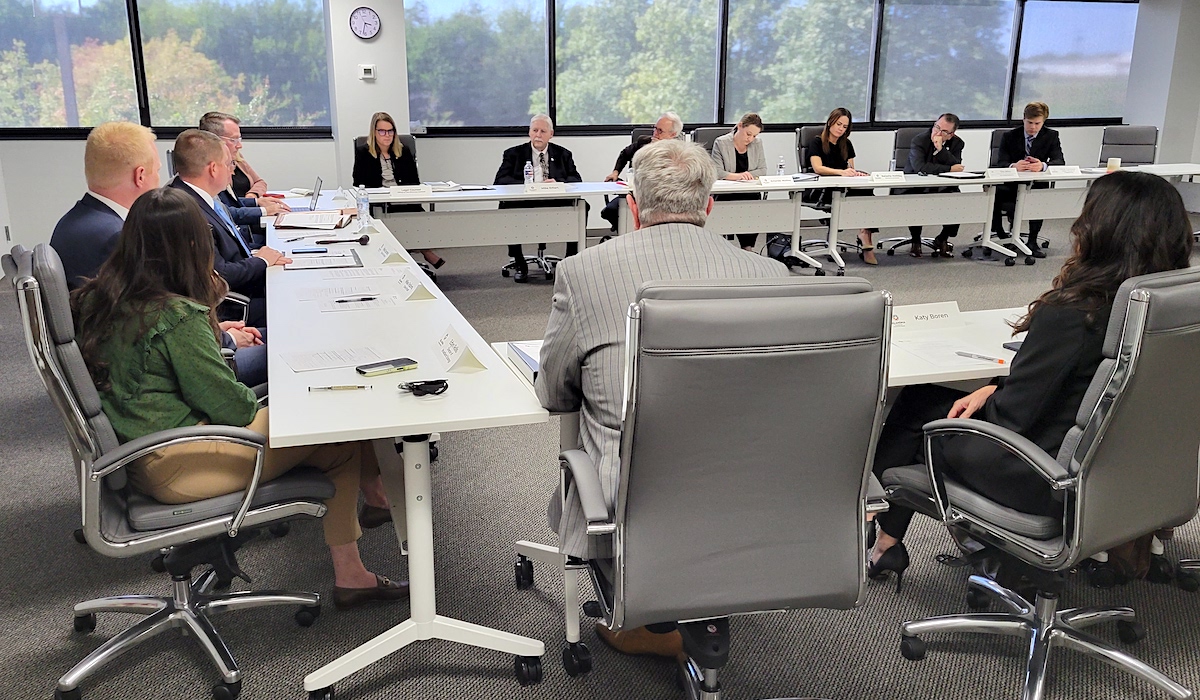
The Oklahoma Broadband Office hopes to award its first grants to internet service providers in January for high-speed internet buildouts in unserved and underserved areas of the state.
After launching a new process for ISPs to seek $374 million in American Rescue Plan Act funding for expanding access to reliable and affordable high-speed internet service in Oklahoma, the OBO received 326 applications by the Oct. 9 deadline to apply. The applications total about $5.1 billion, far surpassing the amount available for this round of projects.
Previously, 133 ISPs filed applications totaling about $4 billion of ARPA funds. They were selected from a batch of proposals submitted through the state of Oklahoma’s ARPA portal in 2021, before the Broadband Office was formed, and 2022.
The OBO discarded its original proposals in August after hearing complaints from ISPs and concerns from its governing board members. Executive director Mike Sanders said a review of the previously proposed projects and supplemental inquiries showed that some of the state’s most challenging geographical areas would not be serviced under the OBO’s original criteria.
The board approved OBO relaunching a three-week window to file new applications.
“There were so many different areas of the state the first time that did not even have one application,” Sanders said. “So, we’re hopeful with this nearly 200 percent increase of applications that in those areas in southeast Oklahoma and western Oklahoma and northeast Oklahoma that we have applications there to serve those unserved and underserved folks.”
A 45-day challenge period to the proposals will begin Monday, Oct. 23. Formally called the Overbuild Prevention Contest Process, it will allow ISPs to review the proposals and help ensure no funding is awarded to provide service to homes and businesses that already have high-speed internet access.
On Oct. 11, Gov. Kevin Stitt approved rules for the process.
“That process obviously will avoid an overbuild of projects building on top of a project.,” Sanders said. “This is very, very important. Why spend taxpayer dollars and give it to an area that already has the service? We’re going to stretch all the money as far as we can make it.”
The OBO staff are reviewing the proposals, a list of which will be on the agency’s website by Oct. 23, Sanders said last week.
“A little bit more work on our end to go through all those applications, but I think that’s a great thing,” he said. “I think competition makes everybody better especially if there’s areas that are absolutely unserved. (…) I think you’re going to see there are going to be the rural areas that you may have only one or two (applications).”
Applicants will be scored on a variety of factors, including workforce standards that provide points if a project is governed by “a project labor agreement” and “a community benefits agreement that offers wages at or above the prevailing rate.” Points are also provided if a project applicant proposes high safety standards and commits to hire “local workers” and “workers from historically underserved communities.”
“We’ve talked to a lot of ISPs, small, large, medium size and we have not had had any pushback when we said, ‘This is what we’d like to do, give us some feedback,’” Sanders said. “And they’ve all been positive on that.”
After the challenge process, staff will present the scores and information to the OBO’s grant subcommittee, which will review and make recommendations to the Oklahoma Broadband Governing Board. Sanders said the board should approve applicants in January.
This is the first grant program administered by the OBO. Others will follow, including $167.7 million from the ARPA Capital Projects Fund and $797.4 million in Broadband Equity, Access and Deployment (BEAD) funds. A public comment period for the BEAD funds is open through Oct. 20.
The ARPA funds must be allocated by the end of next year, Sanders said. Projects funded by that money must be operational by the end of 2026.
During its meeting Oct. 10, the Broadband Governing Board elected Jim Meek, of Okmulgee, to serve as its chairman and Amanda Mullins, of Chickasha, as its vice chairwoman. The pair will lead the nine-member board as it oversees expansion of reliable and affordable high-speed internet service throughout the state.
Meek had been vice chairman of the board and serving as interim chair since June when Stitt removed Mike Fina from the board.
One judge appointed, two face consequences
Last week, Gov. Kevin Stitt appointed Special Judge Richard Hathcoat to be the new district judge for Office 9 of the 14th Judicial District in Tulsa County.
A former civil litigation and criminal defense attorney, Hathcoat worked in the oil and gas industry in Colorado from 2008 to 2019, according to a press release announcing his appointment.
Judicial appointments come after the Judicial Nominating Commission recommends three candidates from a vacant position’s pool of applicants. Currently, the JNC is taking applications for district judge in Office 4 of District 21 and for associate district judges in District 3 and District 20.
The same day of Hathcoat’s nomination, Nolan Clay of The Oklahoman reported that a new Lincoln County District Court judge is facing removal from the bench after she was caught texting during her first murder trial.
According to the 47-page removal petition filed by Supreme Court Chief Justice M. John Kane IV, Judge Traci Soderstrom of Lincoln County “exchanged over 500 text messages with her bailiff Angela Miler in which they mocked the physical appearance of attorneys, jurors and witnesses and used offensive language to deride the State’s attorneys” during a trial for the beating death of a 2-year-old boy.
Soderstrom won election to the bench in 2022 and took office in January.
In another case involving an Oklahoma judge, Garfield County Associate District Judge Brian Lovell was arrested and charged with reckless driving in Austin, Texas, after a road rage incident Sept. 11. According to the probable cause affidavit, Lovell rammed his vehicle into the back of another car multiple times and may have fired his gun at other vehicles while driving down the street.
Lovell is not currently taking cases, according to the Enid News and Eagle.
Kingfisher lawsuit document dispute pending
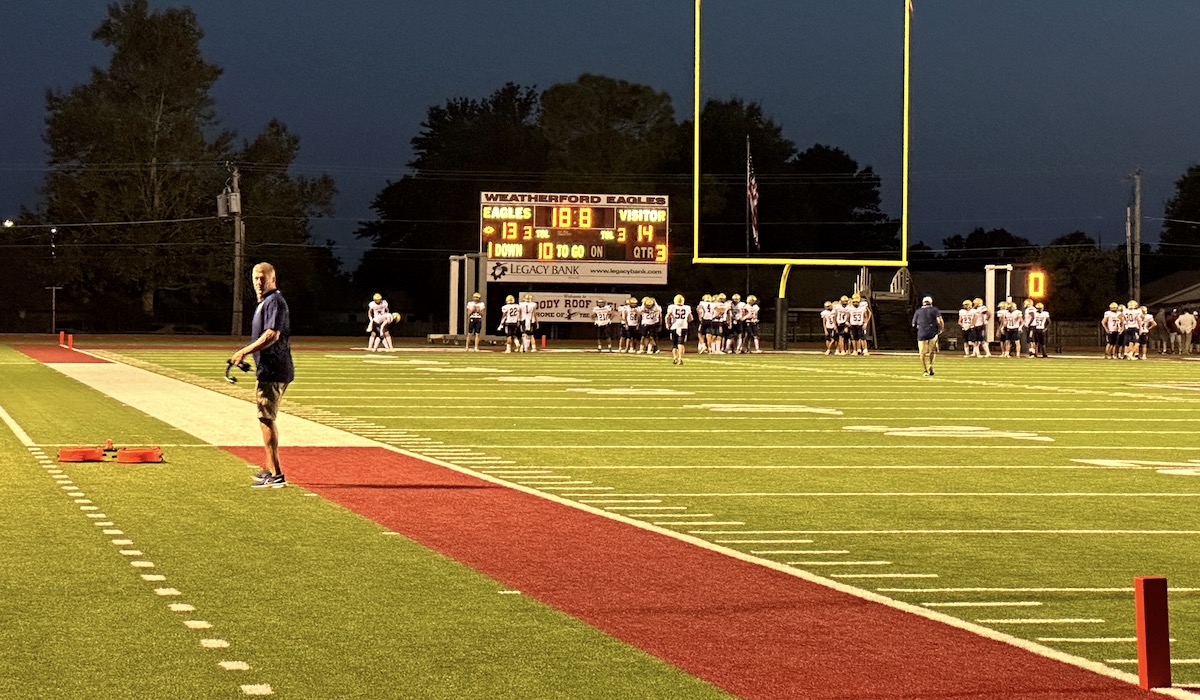
On Friday, Oct. 13, lawyers for Mason Mecklenburg, Kingfisher Public Schools and its football coaches named in a federal hazing lawsuit appeared before federal judge Charles Goodwin to handle a dispute over a document the district says is protected information.
Referred to in filings as “the Timeline,” a document inadvertently provided to Mecklenburg’s lawyers allegedly depicts former KPS Superintendent Daniel Craig’s knowledge of events surrounding the family’s allegations of abuse, which they say constituted “torture” in the football program.
In a previous order, Goodwin had held that the document was protected by the work-product doctrine protecting documents created in anticipation of trial. The matter was later reopened when the timeline was accidentally sent to Mecklenburg’s lawyers and they learned new information that helped them make a better case for why they should be allowed to have the document.
Mecklenburg’s lawyers made that argument during the hearing Friday, while lawyers for the district argued that the question had already been settled once before.
Goodwin did not rule on the matter Friday, instead giving Mecklenburg’s lawyers seven days to file a supplemental brief with more information. Goodwin gave the district’s lawyers seven days after that to submit a response.
Ryan Walters promotes ‘Back to Basics’
On Monday, State Superintendent of Public Instruction Ryan Walters visited schools in Oklahoma’s Panhandle to promote his new “Back to Basics” plan he says will incorporate “free market principles” to help teachers and students focus on reading, math, science and civics.
Walters said at a recent State Board of Education meeting that the plan will include a number of merit-based bonuses for teachers who help improve student outcomes in those core areas, as well as training and other programs for teachers to help increase student achievement.
While Walters announced the “Back to Basics” plan with a price tag of $8 million, a press release distributed Monday labeled the cost at $9.2 million. Walters is also seeking $60.5 million from the state Legislature to fully implement the program in Fiscal Year 2025.
“With this funding, students will have access to an additional 140,000 hours of one-on-one support for math and reading this school year,” OSDE communications director Dan Isett wrote in Monday’s press release. “Teachers and tutors can receive up to $2,400 in tutoring and an additional $4,000 in growth bonuses.”
Promoting the “Back to Basics” plan is not Walters’ only focus at the moment. In a plethora of press releases since the beginning of October, Walters declared a Teach Kids to Read Week “in conjunction with Moms For Liberty,” celebrated his teacher signing bonus program, and condemned Hamas while referencing language in state statute to ask schools to “reflect, meditate, pray, or engage in any other silent activity to show our support for Israel.”
Suzanne Reynolds switching education boards
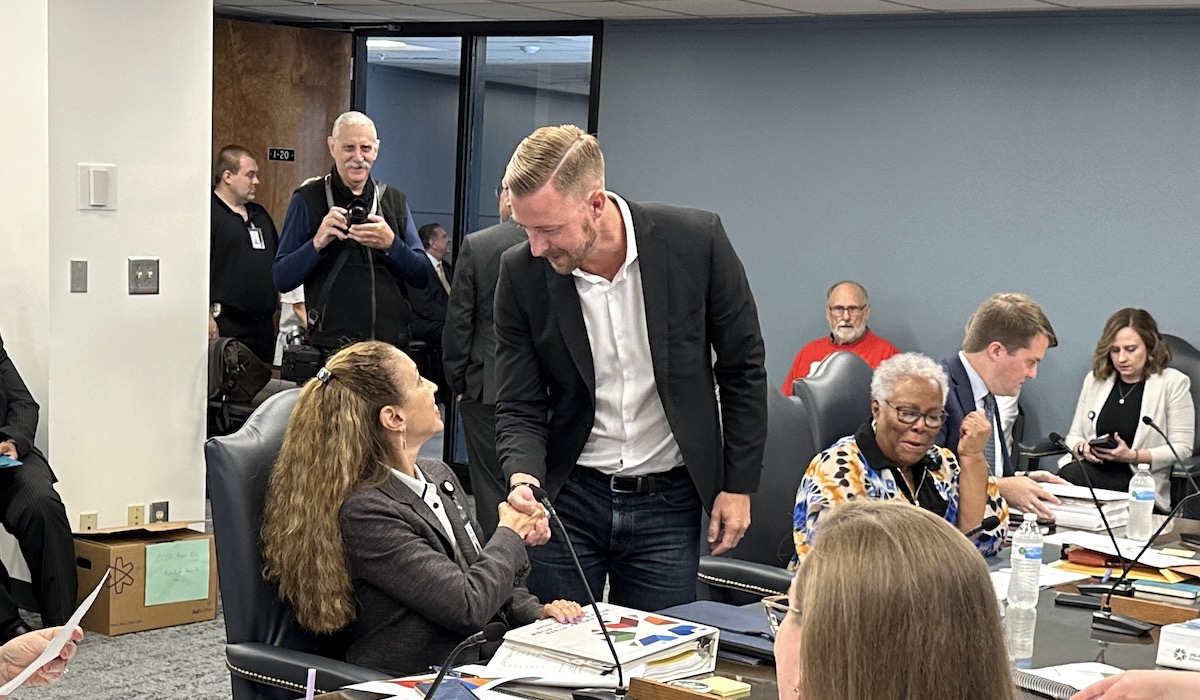
After just 10 months in the role, Oklahoma State Board of Education member Suzanne Reynolds submitted her resignation letter to Gov. Kevin Stitt on Oct. 11.
A pharmacist in Nichols Hills, Reynolds had been aligned with Walters on numerous issues, including questions surrounding transgender students. At a Sept. 28 meeting of the State Board of Education, Reynolds was a vocal supporter of a new emergency OSDE rule concerning gender on student records.
“Just coming from my own background in education and science, and I can say that I am a biologist with a degree in bachelor’s of science. Sex is not assigned at birth. It is determined by chromosomes and genetic code,” Reynolds said. “This is just — it goes against objective truth and reality. It is observed and recorded at birth. So to say that it can just be taken out of your record just is not consistent with what we are biologically as a binary species.”
After her resignation, Stitt immediately appointed Reynolds to the board of regents for the University of Science and Arts of Oklahoma in Chickasha.














